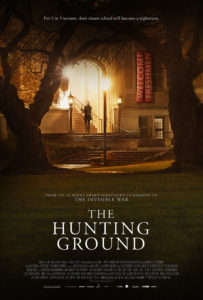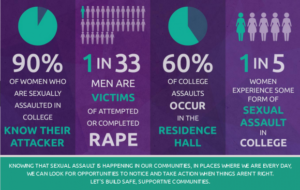By Aurea Bolaños Perea, President’s Assistant Intern

In April I attended the screening of the documentary The Hunting Ground in Sacramento, where I was able to meet the producer of the film Amy Ziering, along with California State Assembly Speaker Toni G. Atkins, Senator Hannah-Beth Jackson, Chair Assemblymember Cristina Garcia – who is also the Vice-Chair for the California Coalition Against Sexual Assault (CALCASA) – and many other organizations that work on bringing awareness to epidemic of campus sexual assault.
I attended as a member of University of California Student Association (UCSA), for which I was the Vice-Chair of the Campus Action Committee and tabled alongside an Associate Court Justice of UC Merced to discuss campus climates, issues, counter-narratives, and the UConsent campaign, a UC student-led campaign whose goal was to protect the basic right of student protection from sexual assault on their campuses, and that a culture of consent is not just supported, but enforced.
In the UC’s alone, over 26,830 are sexually assaulted each year – 1 in 5 women and 1 in 33 men.
In the United States, 1 in 4 college women report being survivors of rape at some point in their lives, with 5% of women on college campuses experiencing rape or attempted rape every year. Moreover, of the women currently attending college or university in the United States, 673,000 of them have experienced rape at some point in their lifetime.
I personally couldn’t take these statistics – especially when I know that many women I have met, along with myself, are part of these numbers.
The Hunting Ground captures the story of 2 survivors, Andrea Pino and Annie Clark, who took the matter of campus sexual assault into their own hands and employed the use of Title IX to fight against the unfair legal protection and institutional cover-ups students face within college campuses. “Brave” is not the word I would use to describe these two women, rather, I use “champions” because they used any and every resource at their disposal to combat the epidemic of campus sexual assault – especially after other survivors were being dismissed by their institutions, because those who have been sexually assaulted are almost always not seen as the victims, but as those who have “tempted” the rapist.

When I watched the film, I was expecting to learn statistics that I would never hear from colleges and universities – but I was not ready to learn the legal, or more likely the illegal process many universities, along with courts, took to solve cases of rape. For example, on December 7th, 2012, Erica Kinsman from Florida State University reported to the police she had been raped hours earlier at a bar.
After that? Tallahassee police took Erica to the hospital to have her complete a rape kit analysis and her bruises were noted under her medical records. Well, afterwards, the police didn’t act on the information Erica gave them, and it wasn’t until 34 days later that Erica herself saw her attacker and reported his identity to the police.
And then? The police waited 2 weeks to contact him. Just to contact him.
I won’t spoil the documentary for you, but as you can see, there is a problem in America. And it isn’t just our legal system, but it is this idea that rape is a norm.
Yes, rape is a norm.
If it wasn’t so, if rape was considered so heinous, so low and despicable, then maybe our schools and legal system would do a better job at putting these rapists and assailants behind bars.
But we know they don’t.
And from then on, rape has become institutionalized.
I can tell you that, as I speak in workshops on sexual assault and take part in safe spaces where survivors of sexual assault recall their stories, there is nothing more deplorable than looking into the eyes of these students and realizing that there are hundreds of thousands like us around the nation – and knowing that many of our schools fail to investigate or influence the process of putting our rapists behind bars.
Being part of UCSA allowed me to be in the frontlines of making sure that the needs of UC students were more than met – they were resolved. That is the only answer I would accept.
The UConsent Campaign demanded that UC President Janet Napolitano and Gov. Jerry Brown provided and implemented mandatory in-person peer consent and bystander intervention training for students, faculty and staff; designating survivor informed students as training leaders; and a minimum of $420,000 for the training this program would require (roughly 96 cents per person trained).
Out of the 10 UC’s, my campus, UC Merced, is one of the handful of the UC’s who has been able to implement all these resources for our students, and is also holding class registration for incoming freshmen or transfer students who do not complete a violence prevention class. Not only did all these UC’s actively invest in the survivors of our campuses, but in the effectiveness of peer education and student leadership.
Something many of our colleges in America lack.
Watch The Hunting Ground this Sunday, November 22 at 5PM PT/ 8PM ET on CNN or click here to watch it online.
If the horrendous act of rape goes unpunished by the police, then in my opinion, it is being okayed by them. By not punishing the men who rape women, they are indeed saying that this is okay to do, and the men will not receive a punishment of any kind. Think about that!